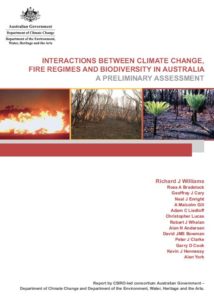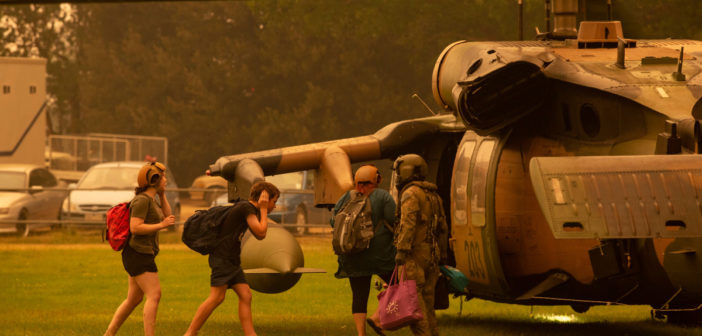
The Australian Defence Force (ADF) contribution to the 2019/2020 Australian bushfire crisis is being significantly increased following the call out of Army Reserve forces and other specialist capabilities.
Importantly, the impacts of climate change on the Australian fire season have been researched and predictions made for over ten years that conditions will worsen. Models suggest these conditions will continue to deteriorate and worsen through to 2050 and beyond.
The increase in ADF personnel and resources will grow , joining forces and integrated with state-based emergency services and resources. The historic call out is further enhanced with the commitment of more ADF aircraft, ships and other key equipment, including the largest vessel, HMAS Adelaide.
Defence has also opened bases throughout the affected regions from Brisbane to Adelaide to provide temporary accommodation for displaced people. Since September 2019, the ADF has worked with Emergency Management Australia to assist with firefighting efforts in New South Wales, Queensland, Western Australia, Victoria and South Australia.
Australian ‘catastrophic’ bushfire conditions predicted well over 10 years ago – to be considerably worse by 2050

Interactions between Climate Change, Fire Regimes and Biodiversity in Australia: A Preliminary Assessment – 2009
In a Consultancy Report prepared for The Climate Institute of Australia, September 2007 ‘Bushfire Weather in Southeast Australia: Recent Trends and Projected Climate Change Impacts‘, Lucas et al wrote: “the model results suggest that fire seasons will start earlier and end slightly later, while being generally more intense throughout their length. This effect is most pronounced by 2050, although it should be apparent by 2020.”
“Increasing our understanding of the interactions between climate change, individual fires and biodiversity in driving fire regimes is imperative if we are to manage fire effectively in Australian landscapes. The effects of climate change are likely to make fire management and biodiversity management more complex in the future, but also increasingly important if the objectives of biodiversity conservation and protection of people and property are to be achieved. Interactions between Climate Change, Fire Regimes and Biodiversity in Australia: A Preliminary Assessment, 2009 Report by CSIRO-led consortium Australian Government – Department of Climate Change and Department of the Environment, Water, Heritage and the Arts.
TO MAKE A DONATION
The NSW RFS has created a dedicated bank account to collect donations. All funds received will be equally distributed between the spouses of Geoffrey and Andrew, and tax receipts will be issued to donors.
Donations can be made into the following account:
| Account name: | NSW Rural Fire Service |
| Bank: | Westpac |
| BSB: | 032-001 |
| Account number: | 183546 |
You can also make a credit card payment online here.
When making a deposit, please include your name.
For international transfers, please use the following:
SWIFT 8 Digit Code: WPACAU2S
Or
SWIFT 11 Digit Code: WPACAU2SXXX
If there is no BSB option with your financial institution, please place the BSB followed by the account number together into the account number field. For example, combining BSB: 032-001 and Account No: 183546 would simply become Account No: 032001183546
To obtain a tax receipt, email committees@rfs.nsw.gov.au with your contact details and date of deposit.






